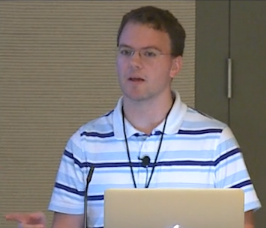CppCon 2014 Embind and Emscripten: Blending C++11, JavaScript, and the Web Browser--Chad Austin
 While we wait for CppCon 2015 in September, we’re featuring videos of some of the 100+ talks from CppCon 2014. Here is today’s feature:
While we wait for CppCon 2015 in September, we’re featuring videos of some of the 100+ talks from CppCon 2014. Here is today’s feature:
Embind and Emscripten: Blending C++11, JavaScript, and the Web Browser
by Chad Austin
Summary of the talk:
Emscripten compiles C or C++ source code into JavaScript so it can run in a web browser. Emscripten is commonly used to port games to the web with no download or plugin required.
Embind is a C++11 binding library that makes it easy to expose libraries written in C++ to JavaScript. This allows JavaScript applications to take advantage of existing bodies of C++ code. In addition, C++ compiled into the asm.js subset of JavaScript is often faster than hand-written JavaScript, so Embind makes it convenient to accelerate JavaScript applications by writing high-performance functionality in C++.
With several motivating examples, this lecture will cover the design of embind, how variadic templates and constexpr facilitate interesting optimizations, and how embind minimizes its impact on the size of the generated JavaScript.

 While we wait for CppCon 2015 in September, we’re featuring videos of some of the 100+ talks from CppCon 2014. Here is today’s feature:
While we wait for CppCon 2015 in September, we’re featuring videos of some of the 100+ talks from CppCon 2014. Here is today’s feature: Overload 126
Overload 126